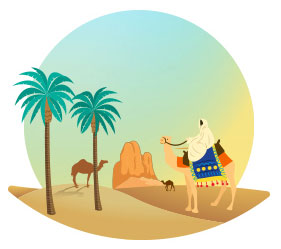Ibrahim Bin Ishaq Al-Bakri
Ibrahim Bin Ishaq Al-Bakri (1): Abu Ishaq Al-Harbi (d. 285 AH) mentioned him and narrated on his authority about ten different times in his book, Al-Manasik, when specifying the locations of different places near Al-Madinah Al-Munawarah. He also mentioned his lineage, giving his name as: Abu Ishaq Al-Bakri, Ibrahim Bin Ishaq Bin Muhammad Bin Zakariya Bin Talha Bin Abdullah Bin Abdel-Rahman Bin Abi Bakr Al-Siddiq, may Allah be pleased with him. He provided valuable information to him regarding the location of his tribe, Banu Talha, regarding which Mu’sab Al-Zubayri said: They lived in the desert, in places to the right of Makkah called Hatha and Al-Atm, as well as in Hitha’ Al-Maslah and Afi’iyah. Ibn Hazm said: The descendants of Talha Bin Abdullah have many descendants in Najd. They fight the Hasanis and the Ja’faris in search of revenge. In our time, they have gone to work in Egypt (2). Among the things that Al-Harbi narrated on the authority of Al-Bakri were some verses of poetry.
Source: Kitab Al-Sulala Al-Bakria As-Siddiqia – Part II, by Ahmed Farghal Al-De’abassi Al-Bakri
Date of Publication
1 Ramadan 1438 AH / May 26, 2017 AD
(1) Al-Manasik wa Amakin Turuq Al-Hajj wa Ma’alim Al-Jazirah pp. 115-116
(2) Ibn Hazm mentioned that the descendants of Talha emigrated from Najd, but as we mention later in the book, there is a mistake in this passage, and they actually emigrated from the eastern portion of the Hejaz near Najd, and not from Najd itself, so this is something that requires more scrutiny.
